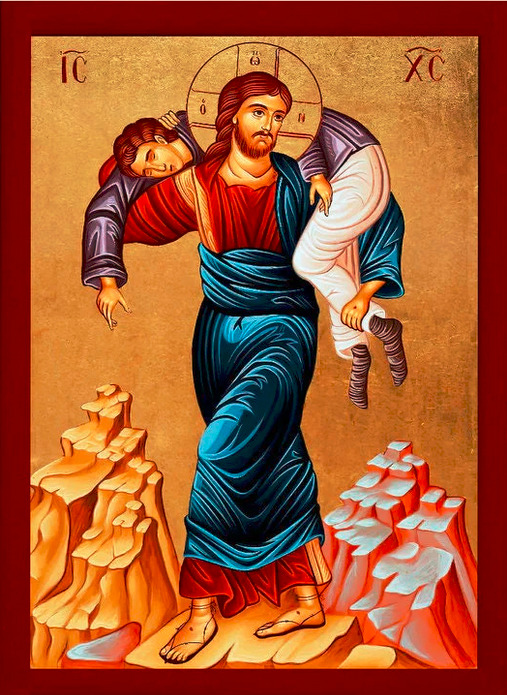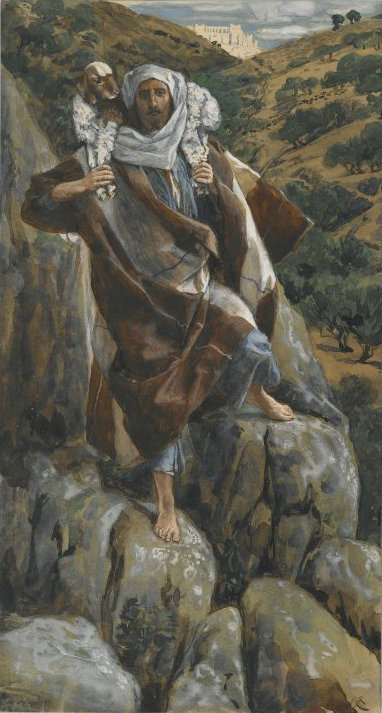#Good Shepherd
Explore tagged Tumblr posts
Text

Luke 19:10
"The Son of Man came to find lost people and save them."
Jesus entered the world to save sinners. When we read the Gospel of Luke, we see Jesus reaching out to men and women, young and old, powerful and forgotten, demon possessed, and the sick. He came to save sinners and those who were lost. He came to save you and me.
Prayer: Holy and righteous God, thank You for your great desire to bring salvation to all people—including me. Open my heart and move me to reach out to You, I need Your grace and mercy. Even more, dear Father, stir me to seek the lost as passionately as your Son, Jesus did and still does. In Jesus' name I ask. Amen.
#lost sheep#good shepherd#bible verse#daily devotional#christian quotes#bible quotes#inspiration#daily devotion#christian quote#christian life#scripture#bible#salvation
203 notes
·
View notes
Text

If you were of the world, the world would love its own. Yet because you are not of the world, but because I chose you out of the world, therefore the world hates you.
~John 15:18
(Image via etsy)
#Lord Jesus Christ#Scriptures#Christian#Good Shepherd#chosen out of the world#Not of this world#Savior
161 notes
·
View notes
Text

Painting with Glass
Good Shepherd stained glass window, New York Historical museum, 77th Street and Central Park West, Upper West Side, Manhattan.
#stained glass#jesus#good shepherd#new york historical#museum#glass art#upper west side#new york city
29 notes
·
View notes
Text

Good Shepherd Sunday
I am the good shepherd, and I know mine and mine know me, just as the Father knows me and I know the Father; I will lay down my life for the sheep. I have other sheep that do not belong to this fold. These also I must lead, and they will hear my voice, and there will be one flock, one shepherd. John 10: 14-16
Prints, plaques & holy cards available for purchase here: (website)
60 notes
·
View notes
Text

The Good Shepherd
I am the good shepherd; the good shepherd lays down His life for the sheep. — John 10:11 | (NASB77) New American Standard Bible Copyright © 1960, 1962, 1963, 1968, 1971, 1972, 1973, 1975, 1977, 1995 by The Lockman Foundation. All rights reserved. Cross References: Psalm 23:1; Isaiah 40:11; Ezekiel 34:2; Ezekiel 34:11; Ezekiel 34:23; John 10:2; John 10:14
Read full chapter
I Am the Good Shepherd
#Jesus#Good Shepherd#life#sacrifice#servant#John 10:11#Gospel of John#New Testament#NASB77#New American Standard Bible 1977 Edition#The Lockman Foundation
14 notes
·
View notes
Text


I can't carry it for you, but I can carry you and it as well.
Samwise Gamgee (J.R.R. Tolkien's The Return of the King)
#Christianity#Catholicism#Good Shepherd#Jesus Christ#Adam and Eve#Lord of the Rings#Samwise Gamgee#J.R.R. Tolkien#Parable of the Good Samaritan#suffering#compassion#icon#redemption#grace
104 notes
·
View notes
Text


Ants in the genus Formica defending their aphid farm on the underside of some wildflowers in Tahoe National Forest (Sierra Mountains), California. Many ants in this genus feed primarily on honeydew, a sugary substance excreted by aphids. The ant colony takes care of their livestock, moving aphids to new locations if they need more food and protecting them from predation. Outside of humans, ants are some of the only animals that grow and tend their own food.
And here's a slightly better photo of the aphids:

#ants#aphids#ant farm#ants tending aphids#nature#bugs#nature photography#biodiversity#animals#inaturalist#arthropods#bugblr#entomology#insect appreciation#hymenoptera#formica#hemiptera#farming#good shepherd#livestock#homesteading#agriculture#wildlife#sierra mountains#tahoe national forest#high sierra#wildflowers#macro photography
25 notes
·
View notes
Text
One Minute Reflection – 9 June – “ Rejoice with Me because I have found My sheep which was lost.” - Luke 15:6
One Minute Reflection – 9 June – “The Month of the Sacred Heart of Jesus” and within the Octave of the Sacred Heart – Saints Primus and Felicianus (Died c304) Confessors, Brother Lay Martyrs – 1 Peter 5:6-11; Luke 15:1-10 – Scripture search here: https://www.drbo.org/ “ Rejoice with Me because I have found My sheep which was lost.” – Luke 15:6 REFLECTION – “When the time of mercy had come (Ps…

View On WordPress
12 notes
·
View notes
Text

The Good Shepherd, James Tissot, between 1886 and 1894
#Eastertide#lectionary#art#art history#James Tissot#religious art#Biblical art#Christian art#Christianity#Good Shepherd#parables#gouache#British art#English art#Anglo-French art#Victorian period#Victorian art#19th century art#Brooklyn Museum
138 notes
·
View notes
Text










Apollo
The Good Shepherd
Laocoon
Sophocles
Mars
collection: Vatican Museums
4 notes
·
View notes
Text

You are with me; Your rod and Your staff, they comfort me. Psalm 23:4
The best thing about our Shepherd is that He does not abandon us in our darkest hour, our lowest low, or in the scariest moment of our life. No, instead He, “is with us , close beside us.” He does not leave us alone in the valley of the shadow of death. Instead, He comes in with us.
So wherever you are today, however deep or dark or scary it is, you don’t have to be afraid. The Saviour, the Lord Jesus Christ, is with us, whether we realise it or not. Isaiah 40:11 says: “He will feed His flock like a shepherd. He will carry the lambs in His arms, holding them close to His heart.”
The Good Shepherd longs to deliver us.
Invite Him in, and I can promise you this: you may have entered the valley broken and scarred, but you will leave it nestled in His embrace and come out unscathed.
#bible verse#daily devotional#christian quotes#bible quotes#inspiration#daily devotion#christian quote#christian life#scripture#bible#good shepherd
179 notes
·
View notes
Text

“The entire Christian life is a holy pilgrimage for each of us, in which we travel and strive to draw closer to Jesus Christ and His Truth. He is the One who calls us all to leave behind the daily routine and walk the path of holiness…”
~Archbishop Nikitas Loulias of Thyateira and Great Britain
(Art via etsy)
#Christian art#Christian life#Lord Jesus Christ#holy pilgrimage to Christ#Truth#walk the path of holiness#Orthodox Christian#Good Shepherd#God#Abide in Him
93 notes
·
View notes
Text

Beata Ewa Białecka, Dobry Pasterz [Good Shepherd], 2007, oil on canvas, 150 x 100 cm. Courtesy of the artist. @abwwia
7 notes
·
View notes
Text
What are you so worried about?
(by request, my homily from Sunday)
What are you so worried about?
My first thought, when someone asks that, is “how much time do you have?”
Because I’ve got a list. Stuff I’m worried about. Stuff I should be worried about. Stuff I forgot to be worried about - that’s going surprise me later when I remember it.
There may be different things on it, but every one of us has a list like that. We’ve got a lot to be worried about.
That’s where you and I are at, when we hear today’s Psalm,
“The Lord is my shepherd; I shall not want. He maketh me to lie down in green pastures. He leadeth me beside the still waters. He restoreth my soul.”
It’s a breath of fresh air – compared to everything that you and I are worried about. One that sounds great, if you’re a sheep.
I grew up grain farming with my dad. We didn’t have livestock. So, I didn’t know much about sheep.
We had some cousins who raised sheep a few miles up the road. I’d always see the sheep standing out there in the pasture when we drove past.
Watching how they moved in one big bunch, seeing how the sheep followed my cousins around, they never struck me as being very bright animals.
But seeing sheep from a car window for a few seconds as you drive past? That doesn’t give you the whole picture.
I found this out the first time I actually worked with sheep.
It turns out that what Jesus is saying in the Gospel about who sheep will follow is right.
Sheep won’t follow just anybody. In fact, they won’t follow anybody – until they get to know you.
If you go out in the pasture and start calling sheep that don’t know you, they’ll just look at you.
They don’t waste their time with people they don’t know.
Sheep are very peaceful animals.
If you get upset and start yelling at them, they’ll just walk away.
They don’t waste their time with people who are upset and agitated.
As it turns out, sheep do what they do, because they know what they want.
And what they want is to be at peace.
And they do what they do - to get that. Because peace doesn’t happen by accident.
You and I can’t wait to have peace when our list of things to worry about runs out. Because every day, something else adds itself to the list. Truth be told, we’ll never get to the end of that list.
That’s why if you and I want peace, we can’t wait for it to happen. Because peace doesn’t happen by accident.
We need peace right in the middle of it all. We need peace, even though we’ve still got a list.
So, what do sheep have to do with that?
For animals that want to be at peace, sheep are sitting ducks for pretty much anything that wants to get them.
They can’t run fast. They don’t kick very well. They don’t have claws or sharp teeth.
Sheep are basically defenseless. Sheep know this. That’s why they rely on the shepherd to take care of them.
And the shepherd does. The shepherd makes their peace possible.
When a storm’s coming in, the sheep will follow the shepherd to shelter.
When they hear wolves or coyotes, the sheep know the shepherd will fight their battles.
That is what the sheep do. What the sheep don’t do - is worry. No sheep has ever worried and “what-iffed” themselves into a sleepless night.
Because they know that as long as they’re with the shepherd, everything will be fine.
That’s what the 23rd Psalm is telling us – “yea, though I walk through the valley of the shadow of death, I will fear no evil, for thou art with me.”
That’s what Jesus is telling us in today’s Gospel. Making it clear that there is no limit to what the Good Shepherd will do to protect His sheep.
If you and I want peace, we need to be like sheep.
As much as we may not like to admit it, there’s not much that you and I can do to stop most of what wants to be on our list of things to worry about.
And even when we can stop some of those things, you and I can’t stop everything. As hard as we try, there will always be something that finds its way onto that list.
Which is why you and I need to be like sheep.
Don’t waste your time thinking about your list of things to worry about.
Instead, think about the Good Shepherd who is watching over you. And stay in peace.
The God who has always loved you, from before you were born, is guiding you and protecting you. Even now.
That doesn’t mean that life will become magically trouble-free and nothing bad will ever happen, if you don’t focus on all the reasons to worry.
We all know from experience that sometimes the only way out is through.
But instead of looking at everything that’s on the list, instead of focusing on the reasons to worry in life, look to God.
The Good Shepherd who makes our peace possible.
When the storms come in, be like sheep.
When you hear wolves and coyotes, be like sheep.
As long as you’re with the Shepherd, everything will be fine.
This is the lesson from the sheep.
Stay in peace. Trust the Good Shepherd. Be like sheep.
Sunday’s Readings
#Trust God#Peace#God#Jesus#Catholic#Christian#Church#Stay in Peace#Worry#Worrying#Sheep#Good Shepherd#Moments Before Mass
48 notes
·
View notes
Text

He Restoreth my Soul
2 He has me lie down in grassy pastures, he leads me by quiet water 3 he restores my inner person. He guides me in right paths for the sake of his own name. — Psalm 23:2-3 | Complete Jewish Bible (CJB) Complete Jewish Bible Copyright 1998 by David H. Stern. Published by Jewish New Testament Publications, Inc. All rights reserved. Cross References: Revelation 7:17; Psalm 36:8; Psalm 5:8; Psalm 19:7; Psalm 25:9; Psalm 31:3; Psalm 46:4; Psalm 65:11; Psalm 85:13; Psalm 109:21; Psalm 139:10; Psalm 143:10; Proverbs 4:11; Proverbs 8:20; Isaiah 49:10; Ezekiel 34:14-15
Read full chapter
What does it mean that the Lord is my Shepherd (Psalm 23)?
#Jesus#Good Shepherd#guidance#safety#provision#restoration#refreshing#soul#glory#Jesus' name#Psalm 23:2-3#Book of Psalms#Old Testament#CJB#Complete Jewish Bible#Jewish New Testament Publications Inc.
9 notes
·
View notes
Text

I was treated today by the beautiful ladies at our Sacred Heart Parish! Thank you!
#sacred heart#catholic#faith#halloween#treats#good shepherd#jesus#heaven on earth#pumkin#guidance#god is with us#triumphant
6 notes
·
View notes